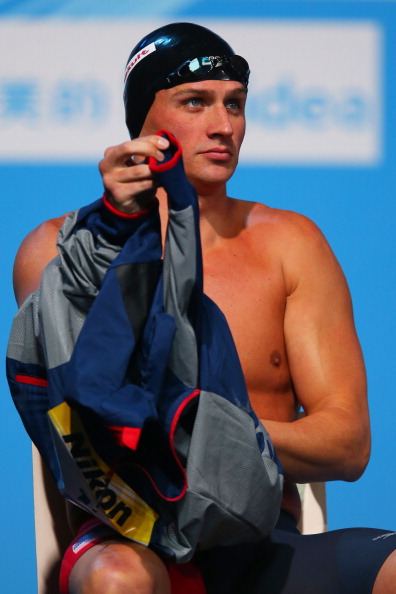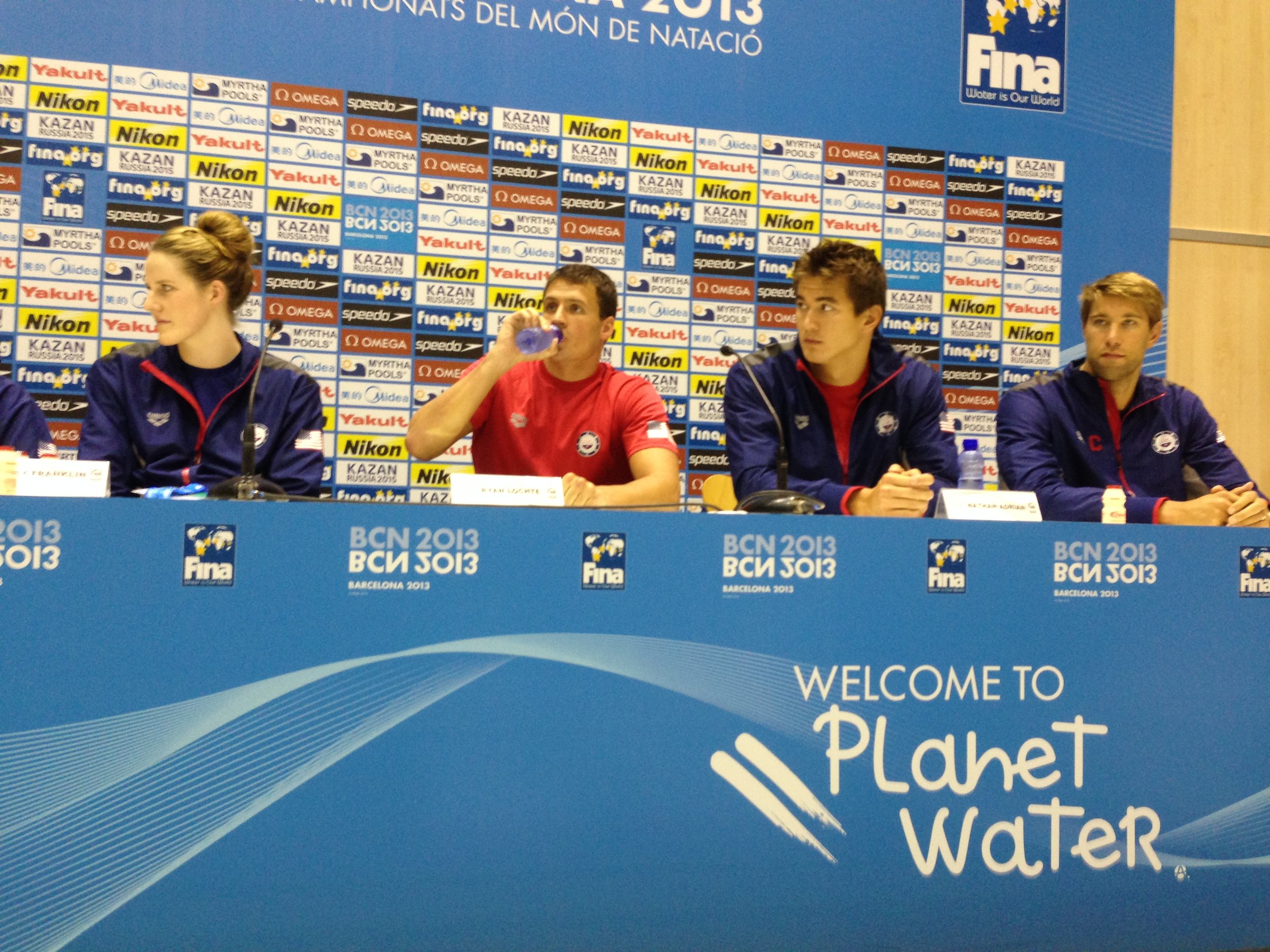BARCELONA -- It is Ryan Lochte's fate that he was born in 1984 -- on August 3, to be precise. The good news is that it's his birthday on Saturday. Happy 29 to a guy who is a lot -- and, for emphasis, a lot -- smarter than a good many people think, and a lot more sensitive, who is incredibly gracious with children, autograph-seekers and photo-takers, and patiently answers all manner of questions, no matter how inane.
The unshakeable challenge for Ryan Lochte is that he is not Michael Phelps (who, by the way, turned 28 in June). So even on a night at the Palau Sant Jordi in which Lochte had demonstrated anew that he is unequivocally one of swimming's all-time greats, racing a triple believed to be unprecedented in world championships or Olympic history, Lochte was nonetheless presented at a late-night news conference with a query about Phelps.
"Do you miss Michael" he was asked.
"Do I miss Michael? Of course. He's the toughest competitor I have ever had to race against. The friendship we've grown -- it's amazing. I love a challenge. Whenever I stepped on the blocks, it was a challenge racing him, and I definitely miss him."
The general rule in a news conferences is that anyone can ask anything. Surely, though, on this night, Ryan Lochte deserved singular attention. He swam three races in about an hour and a half, winning two gold medals and posting the top time at an event, the 100-meter butterfly, he's competing in at a major international meet for the first time.
Lochte won the 200 backstroke. He then posted the fastest time in the semifinals of the 100 fly. The he put the Americans ahead for good in the 4x200 relay.
This was a triple of -- truly -- epic proportions.
It's all the more outrageous considering, as Lochte has noted several times here, he did not put in his usual beast-like training -- that because of all the fun he allowed himself after the 2012 Olympics, including his reality-TV show.
"My whole body is hurting me," he said at the news conference. "There's no way about it. I'm sore. Everything."
To show you how hard it is to gin up motivation to win even one medal at a world championships, in particular the year after the Olympic Games, here is Tyler Clary, third in Friday's 200 back, winner of the event last year in London.
Lochte touched Friday in 1:53.79, Clary in 1:54.64, Poland's Radoslaw Kawecki in between in 1:54.24. Clary said his "only goal" Friday was to "have a very good race technically" and swim "1:54-mid, and that's exactly what I did."
'It's hard to find the motivation to do it, yes," Clary acknowledged, adding, "I went into that event [in London] not expecting to win. I knew I was in contention for a medal but when I touched the wall and I saw '1' and 'Olympic record' next to my name, I absolutely lost it in the next couple weeks after that race. Pure pandemonium.
"And to be able to come back, right away, get right back in the water with your heart fully into it, is really tough. I made it doubly hard on myself coming back at 220 [pounds] when I usually swim at 190."
Now throw in, like Lochte, the demands of a filming a reality-show.
French sprinter Fred Bousquet, fifth in qualifying Friday in the men's 50 free, said of Lochte, laughing, "I don't even want to talk about him. He is a freak."
Bousquet, who went to college at Auburn and is completely conversant in American culture, added, "He's got cojones, as we would say in Spanish. The TV show, the temptations -- not to lose enthusiasm. If he's still walking tonight after that relay, it'll be impressive."
Anthony Ervin, the Sydney 2000 50 free gold medalist who posted the second-fastest time in the one-lap sprint Friday, called Lochte's triple a "Herculean feat of strength," adding, "I can barely handle doing one lap twice in 12 hours. And that man is going to be on the podium every day."
Ricky Berens, who swam the anchor leg of the U.S. relay, called Lochte's performance "absolutely one of the toughest triples you can do," adding he was himself inspired: "If [Lochte] can do all those races, I know I can pop off something good, too."
The TV show of course, is called, "What would Ryan Lochte Do?" The obvious question after the triple -- why did Ryan Lochte do it?
There are two answers.
There was the joke Lochte offered at the news conference: "I thought as you get older you do less events. In my case you do more."
And then there's the real answer, buried in the answer he gave about Phelps. Lochte loves a challenge.
Phelps, for instance, swam three races in one session at the 2004 U.S. Olympic Trials -- the 200 back and 200 IM finals and the 100 fly semis -- and Lochte did the same thing last year at the Trials in Omaha.
This, though, is the worlds. And Lochte's program Friday is arguably beyond compare -- not just because he was defending world titles but because the level of competition was even a notch higher.
Here was Lochte's night:
613 pm: Lane 5, 200 back begins.
615 pm: Wins in 1:53.79, 15-hundredths faster than he swam in winning bronze in the race in London. The victory is his third straight world title in the event, the eighth straight time a a U.S. man has won it, his 14th world championships gold. He goes straight to the warm-down pool and swims a few laps.
653 pm: Medals stand for The Star-Spangled Banner.
704 pm: Call room, seat 4, front row, his warm-up jacket open, Lochte is yakking it up with Hungary's Laszlo Cseh. Lochte had managed after getting his medal to swing by the massage therapist's room and get a shake to drink.
713 pm: Dives in pool for his heat of 100 fly, Lane 1.
714 pm: Wins heat in 51.48, a personal best, second-fastest in the world this year, back to warm-down pool.
745 pm: U.S. 4x200 relay team is on deck, Lochte assigned second leg.
747 pm: Dives in pool, Lane 4, with U.S. looking to make up ground because Russia's Danila Izotov had opened in 1:45.14. Lochte's effort, 1:44.98, lifts U.S. into first by 63-hundredths of a second, and the Americans go on to win in 7:01.72. It was the first U.S. 4x200 relay without Phelps since 2001; the U.S. has won the event continuously since 2004.
After all the other swimming he had done, Lochte's relay split, it would turn out, would be the night's second-fastest.
Only China's Sun Yang -- the 400 and 800 gold medalist -- went faster, 1:43.16.
The relay gold makes Lochte the first swimmer in world championships history to win two gold medals in one day on three separate occasions. He did it previously on March 30, 2007, and July 29, 2011.
No matter what happens in the 100 fly, what happened here Friday sets the stage for the world championships in Kazan, Russia, in 2015, and the Summer Games in Rio de Janeiro in 2016.
Lochte said he approaches everything day by day, step by step. Even so, he said:
"After the Olympics, my body and my mind -- it needed some down time. It needed to get away from the sport. It needed to re-charge. I took some time off. I don't know if it was the right decision or not. I do know when I was out of the pool I was having fun."
But, he quickly added, "When it came down to it, I am still an Olympic athlete. My goal is 2016. I knew I had to get back in the water, sooner than I thought."
And, he said, "The confidence I have coming out of this meet is pretty good leading up to 2016."
You think?






